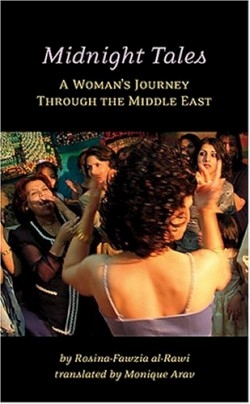Midnight Tales
A Woman's Journey Through the Middle East
“When the nights were hot, a mysterious world appeared in Baghdad,” recalls the author. Armed with wool mattresses and cool white sheets, Al-Rawi’s family and neighbors would climb onto their roofs to talk, laugh, and sleep under the stars. “‘Will you come to the city with me to do some shopping tomorrow’? called Aunt Fatima to her friend on the neighboring roof. ‘Yes, I’d like to’!”
Such stolen moments abound in “Midnight Tales,” a collection of personal essays that celebrate the author’s travels throughout the Middle East. Born in Baghdad, partially raised in Beirut, and schooled in Cairo, Al-Rawi organizes her book chronologically into six sections, corresponding to the nations she has lived in and visited. Topics range from the whimsical (as a young girl the author predicted her aunt’s moods based on the shoes she wears) to the profound (Al-Rawi describes sneaking a Palestinian friend past an Israeli checkpoint during the 1982 Lebanon War).
This mix of lighthearted and emotive vignettes reads somewhat like a diary—honest, fresh, and never predictable. Currently, the author divides her time between Jerusalem and Vienna, where she teaches Sufism and Middle Eastern dance. She has written several previous books, including Grandmother’s Secrets: The Ancient
Rituals and Healing Power of Belly Dancing and Golden Sky, Red Earth: Women’s Lives in Palestine*. The changing role of women in Middle Eastern society is a central theme of* Midnight Tales*. A devout Muslim and accomplished career woman, Al-Rawi rejects the patriarchal interpretation of the Koran that considers independence antithetical to femininity, and applauds those nations where progress has been made.*
In her travels, the author discusses these issues with women of all different social classes and religious beliefs, from the secular businesswomen of Syria to the Bedouin mothers of Dalma. Often their encounters yield surprising insights. Commenting on foreigners’ obsession with the veil as a symbol of oppression, a frustrated Egyptian student remarks, “Was wearing a miniskirt or not ever an essential issue among Western
women’s movements?”
By framing social commentary in the context of dialogue (often with herself as a silent observer), Al-Rawi avoids alienating readers with strong views on the politics of the region. Anyone with an interest in Middle Eastern cultures or feminist studies will find this varied collection enlightening, accessible, and never preachy. At times, the author’s passive method of imparting information feels forced, however, as characters recount detailed local histories that might be better served as narrative. Luckily, the allure of the material outweighs any awkward moments, bringing to light the soul of a people that has been relegated to the shadows for too long.
Disclosure: This article is not an endorsement, but a review. The publisher of this book provided free copies of the book to have their book reviewed by a professional reviewer. No fee was paid by the publisher for this review. Foreword Reviews only recommends books that we love. Foreword Magazine, Inc. is disclosing this in accordance with the Federal Trade Commission’s 16 CFR, Part 255.

